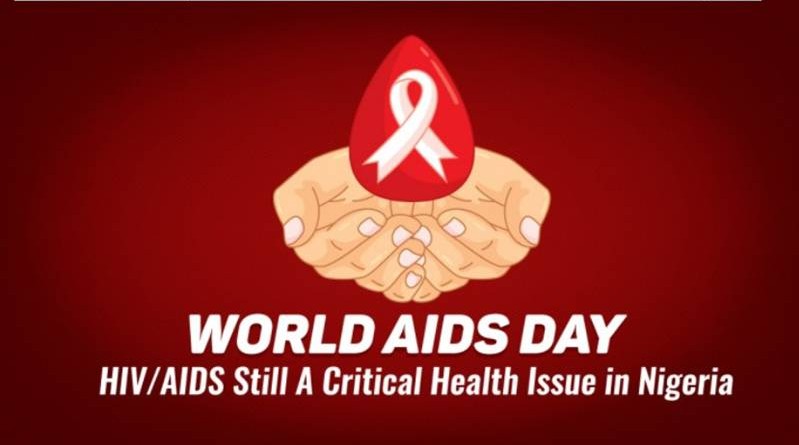World Aids Day: HIV/AIDS Still A Critical Health Issue in Nigeria – NOIPolls
Abuja, Nigeria. December 4, 2018 – NOIPolls proudly joined global partners to commemorate World AIDS Day which is observed yearly on 1st December. The World AIDS Day is marked every December 1st to encourage communities to unite against HIV, show support for people living with the disease, and remember those who have passed away due to AIDS. The theme of this year’s Word Aids Day is ‘‘Know Your Status’’ and it is focused on influencing people to know their HIV status and access antiretroviral drugs if tested positive.Since the first cases of HIV were reported more than 35 years ago, 78 million people have become infected with HIV and 35 million have died from AIDS-related illnesses.[1] Despite the effort in creating awareness, the United Nations Program on HIV/AIDS (UNAIDS) estimates that more than 9.4 million people living with HIV still do not know their status.
Ahead of the 2018 World AIDs Day, the Nigerian Minister of Health, Professor Isaac Adewole, speaking at the 2018 World AIDs Day commemoration event held at the Banquet Hall of the State House in Abuja on Thursday 29th November 2018, said everyone taking the necessary steps to know their status would enable Nigeria meet the first 90 target by 2020 which is 90 percent of the people knowing their HIV status.[2] In Nigeria, the official HIV prevalence as reported by UNAIDS is 3.2 percent among the adult population, giving a total estimate of 3.4 million Nigerians living with HIV. With these figures, Nigeria has the second largest HIV epidemic in the world and has one of the highest new infection rates in sub-Saharan Africa.[3] Many people living with HIV in Nigeria are unaware of their status and the country continues to fall short in terms of providing the recommended number of HIV testing and counselling sites.[4]
In light of the 2018 World AIDS Day, NOIPolls reflects on some findings from its past poll on HIV/AIDS in Nigeria which mainly gauged awareness of transmission modes and suggestions on reducing the epidemic. The poll which was conducted in 2013 revealed that a larger proportion of Nigerians (86 percent) stated that HIV/AIDS is mostly contacted through sexual intercourse. Additionally, an overwhelming majority (90 percent) of the respondents agreed that HIV/AIDS is a critical health challenge in Nigeria and 51 percent of respondents advocated for better sensitization and media programs to boost awareness. These findings corroborate the 2018 report on HIV/AIDS by USAID which showed that Nigeria has the second largest number of people living with HIV globally and accounts for nine percent of the global HIV burden. Also, a recent data book by Global information and education on HIV and AIDS reported that approximately 150,000 people died from AIDS-related illnesses in Nigeria in 2017.
The figure below showed that most Nigerians were aware of the common modes of contracting HIV/AIDS as 86 percent mentioned sexual intercourse and residents from the North-East zone represent the larger share of Nigerians who mentioned this. This is further substantiated by a research conducted by Saudi Journal of Biological Sciences in May 2018 which that Heterosexual intercourse is the major route for HIV transmission in Nigeria accounting for over 80% of the infections. It therefore becomes pertinent that the government and other relevant stakeholders ensure that as many people as possible get tested and that treatment is made available for those who have tested positive to the virus.

Subsequently, when Nigerians were asked if they thought that HIV/AIDS is a critical health issues, an overwhelming majority of 90 percent which amounts to about 9 in 10 respondents acknowledged that it is a critical health issue while 10 percent thought it was not a critical health issue.

In a bid to reduce the incidence of HIV/AIDS in Nigeria, majority (51 percent) of the respondents believed that deploying more far reaching sensitization and media programs to create awareness about HIV/AIDS, its prevention and treatment plans would go a long way in combating the epidemic. It is worthy to note that 24 percent of respondents suggested that there should be more HIV testing centers in the country, and this has been identified as a critical tool in fighting the epidemic. It follows that if there were more test centers, more people would be aware of their status which would then inform preventive and management measures depending on the outcome of their results.

In conclusion, the poll revealed that Nigerians showed awareness on HIV/AIDS as a critical health issue in the country which affects all population groups and geographical areas. Although Nigeria’s response to HIV/AIDS is guided by the National Strategic Framework 2017–2021, government and other stakeholders should mainly focus on ending AIDS by achieving zero new infections rate, zero AIDS related deaths, zero discrimination against people living with HIV/AIDS and elimination of mother-to-child transmission. Providing anti-retroviral treatment for Nigerians living with HIV doesn’t only benefit those already living with HIV, it also naturally reduces the chance of onward transmission to others.
It is difficult to tackle the HIV epidemic without access to treatment, therefore, considerable commitment, funding and resources need to be expended to expand access to treatment as a tool for both managing people living with HIV and as preventive method as well. Also, the engagement of all members of the society, especially those who are most vulnerable to HIV, is key to a unified HIV response. Finally, HIV testing should be intensely encouraged among the Nigerian population to ensure everyone knows their HIV status because without knowing how many people are living with the virus, it is hard to reduce new infections and provide HIV treatment to all.
Disclaimer
This press release has been produced by NOIPolls Limited to provide information on all issues which form the subject matter of the document. Kindly note that while we are willing to share results from our polls with the general public, we only request that NOIPolls be acknowledged as author whenever and wherever our poll results are used, cited or published.
NOIPolls hereby certifies that all the views expressed in this document accurately reflect its views of respondents surveyed for the poll, and background information is based on information from various sources that it believes are reliable; however, no representation is made that it is accurate or complete. Whilst reasonable care has been taken in preparing this document, no responsibility or liability is accepted for errors or fact or for any views expressed herein by NOIPolls for actions taken as a result of information provided in this report. Any ratings, forecasts, estimates, opinions or views herein constitute a judgment as at the date of this document. If the date of this document is not current, the views and content may not reflect NOIPolls’ current findings and/or thinking.
Press Contact
The Editor
Email: [email protected]


